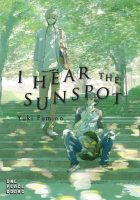My News and Reviews
The winner of The Royal Tutor manga giveaway was announced last week at Experiments in Manga. As usual, I also used the giveaway as an excuse to compile a thematic list of manga–in this particular case, a list of some of the manga available in English which feature royalty. This week I’m (once again) probably going to be switching around my regular posting schedule a little bit. Normally, this week would feature the Bookshelf Overload for July, but I’ve been working on an in-depth review of Kazuki Sakuraba’s A Small Charred Face which I would like to post sooner rather than later.
There are a few interesting things that I’ve recently encountered online that I’d like to share. First of all, MariNaomi has created the Queer Cartoonists Database (which does include mangaka), a followup of sorts to the Cartoonists of Color Database, both of which are fantastic resources. Khursten Santos and Thomas Baudinette, both scholars of queer themes in Japanese media, discuss gay manga, boys’ love, and such on the latest episode of the Fujojocast. Also, hat tip to Khursten for pointing out the recent audio recording and transcript of Masafumi Monden’s fascinating talk A Portrait of Shōjo: The Poetic Ambience of Japanese Girlhood.
As for some of the Kickstarter projects that have caught my attention lately: Sweethearts of 1989 is a queer romance comic by Kale Jeffery which is also in part an homage to anime and manga from the 1980s and 1990s. Zainab Akhtar is campaigning for a second volume of Critical Chips, an anthology of comics and comics criticism. (At least one essay will be about manga, specifically Taiyo Matsumoto’s No. 5.) Allison Shaw’s ongoing comic adaptation of the Greek myth of Persephone looks lovely. And of course, the Sparkler Monthly Year 5 campaign is still underway and could use a boost to help fund another twelve months of fantastic new content.
Quick Takes
 I Hear the Sunspot by Yuki Fumino. Although in Japan it was serialized in a magazine that focuses on boys’ love manga, Fumino didn’t originally envision the story of I Hear the Sunspot with that in mind. However, even if the potential for the manga’s to lead characters to become romantically involved was added at a later point, their relationship grows and develops beautifully. After an illness in middle school resulted in permanent hearing loss, Kohei has struggled not only with his sudden disability but also with finding acceptance and understanding from others. Now in law school, Kohei has become withdrawn and has closed himself off from his peers, though that doesn’t stop his more outgoing and personable classmate Taichi from trying to become his friend. As the importance of their unexpected friendship naturally takes hold both Kohei and Taichi have their own issues to deal with, but it is obvious that they care tremendously for each other. As a whole, I Hear the Sunspot is a lovely story, but the nuanced characterization and character growth in the manga is particularly excellent. The depiction of Kohei’s hearing loss and how it has impacted his life and who he is also handled very well. I wholeheartedly loved I Hear the Sunspot.
I Hear the Sunspot by Yuki Fumino. Although in Japan it was serialized in a magazine that focuses on boys’ love manga, Fumino didn’t originally envision the story of I Hear the Sunspot with that in mind. However, even if the potential for the manga’s to lead characters to become romantically involved was added at a later point, their relationship grows and develops beautifully. After an illness in middle school resulted in permanent hearing loss, Kohei has struggled not only with his sudden disability but also with finding acceptance and understanding from others. Now in law school, Kohei has become withdrawn and has closed himself off from his peers, though that doesn’t stop his more outgoing and personable classmate Taichi from trying to become his friend. As the importance of their unexpected friendship naturally takes hold both Kohei and Taichi have their own issues to deal with, but it is obvious that they care tremendously for each other. As a whole, I Hear the Sunspot is a lovely story, but the nuanced characterization and character growth in the manga is particularly excellent. The depiction of Kohei’s hearing loss and how it has impacted his life and who he is also handled very well. I wholeheartedly loved I Hear the Sunspot.
 Liselotte & Witch’s Forest, Volumes 1-3 by Natsuki Takaya. While waiting for the next volume of Twinkle Stars to be released, I figured I might as well give another of Takaya’s recently-translated manga series a try. (Liselotte & Witch’s Forest is actually one of Takaya’s most recent manga period, although I believe in Japan it’s on hiatus at the moment.) So far, while I am still enjoying the series, Liselotte & Witch’s Forest doesn’t work as well for me as either Twinkle Stars or Fruits Basket. I think the biggest impediment is that there seems to be a significant imbalance in the tone of the manga. The underlying story is dark and tragic–Liselotte & Witch’s Forest largely following in the tradition of Western fairy tales–but the narrative often relies heavily on lighthearted humor to carry it out. As a result, it feels as though Takaya can’t quite decide whether the series should be a drama or a comedy; every time something serious happens it’s countered by something ridiculous and it doesn’t always mesh well. It also takes a little while for the story to take off, although it’s interesting once it does. A young woman of noble birth, the titular Liselotte is now living in exile along with two servants, her stubborn cheerfulness obscuring the anguish she feels.
Liselotte & Witch’s Forest, Volumes 1-3 by Natsuki Takaya. While waiting for the next volume of Twinkle Stars to be released, I figured I might as well give another of Takaya’s recently-translated manga series a try. (Liselotte & Witch’s Forest is actually one of Takaya’s most recent manga period, although I believe in Japan it’s on hiatus at the moment.) So far, while I am still enjoying the series, Liselotte & Witch’s Forest doesn’t work as well for me as either Twinkle Stars or Fruits Basket. I think the biggest impediment is that there seems to be a significant imbalance in the tone of the manga. The underlying story is dark and tragic–Liselotte & Witch’s Forest largely following in the tradition of Western fairy tales–but the narrative often relies heavily on lighthearted humor to carry it out. As a result, it feels as though Takaya can’t quite decide whether the series should be a drama or a comedy; every time something serious happens it’s countered by something ridiculous and it doesn’t always mesh well. It also takes a little while for the story to take off, although it’s interesting once it does. A young woman of noble birth, the titular Liselotte is now living in exile along with two servants, her stubborn cheerfulness obscuring the anguish she feels.
 Stages of Rot by Linnea Sterte. The comic Stages of Rot is the first published work by Sterte, an illustrator and animator currently based in Sweden. I wasn’t previously aware of Sterte’s creative output before reading Stages of Rot, but if the comic is at all representative, it will be well worth seeking out more. Although Stages of Rot does include some dialogue and narration, the comic is largely wordless, the strength of Sterte’s gorgeous illustrations easily carrying the flow of the narrative. The story unfolds in five chapters, each of which uses a different palette of muted colors to depict the passage of time and the evolution of nature and civilization within the fantastical world that Sterte has created. The title is derived from the comic’s narrative impetus–the body of a giant sky whale has crashed to the earth, the creature’s death allowing both life and conflict to flourish in ways that would have otherwise been impossible, the accomplishments of one era in some ways dependent on the decay of another. If nothing else, the comic is visually stunning, but the themes exploring the cyclical nature of life and death are also marvelously executed. Stages of Rot is a curious, beautiful, and ultimately hopeful work; I am very glad to have encountered it.
Stages of Rot by Linnea Sterte. The comic Stages of Rot is the first published work by Sterte, an illustrator and animator currently based in Sweden. I wasn’t previously aware of Sterte’s creative output before reading Stages of Rot, but if the comic is at all representative, it will be well worth seeking out more. Although Stages of Rot does include some dialogue and narration, the comic is largely wordless, the strength of Sterte’s gorgeous illustrations easily carrying the flow of the narrative. The story unfolds in five chapters, each of which uses a different palette of muted colors to depict the passage of time and the evolution of nature and civilization within the fantastical world that Sterte has created. The title is derived from the comic’s narrative impetus–the body of a giant sky whale has crashed to the earth, the creature’s death allowing both life and conflict to flourish in ways that would have otherwise been impossible, the accomplishments of one era in some ways dependent on the decay of another. If nothing else, the comic is visually stunning, but the themes exploring the cyclical nature of life and death are also marvelously executed. Stages of Rot is a curious, beautiful, and ultimately hopeful work; I am very glad to have encountered it.